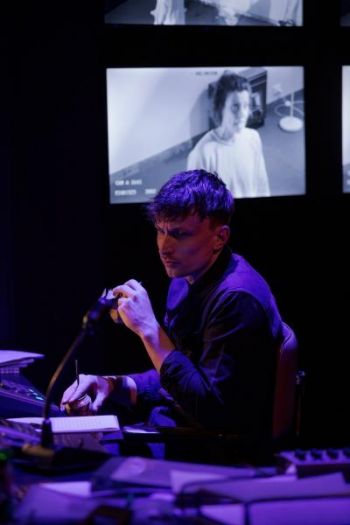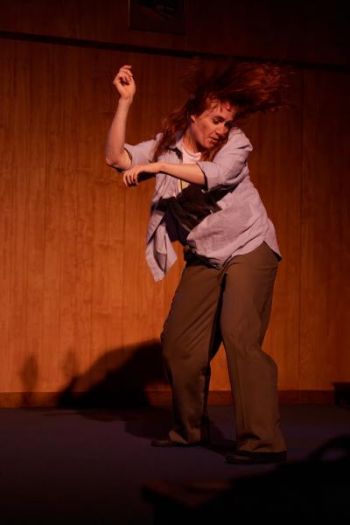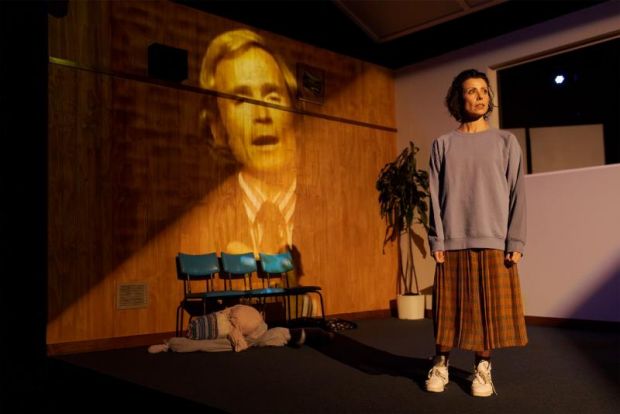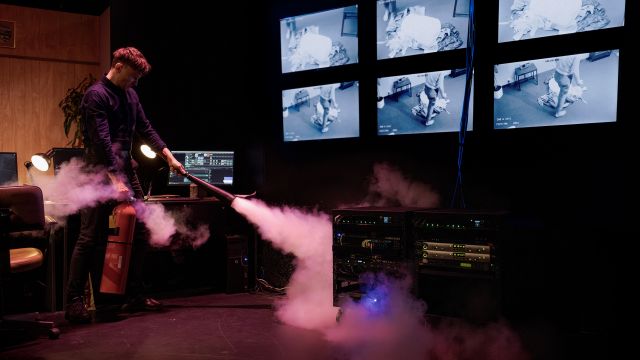Arlington
To many the word “Arlington” evokes pictures of the thousands of white headstones guarding thousands of American souls lost to wars since 1861. It’s a dark picture – and Enda Walsh’s play of that name is similarly dark. He conjures a dystopian society beyond 1984 or Brave New World or Severance that interrogates its citizens and leaves them empty of their dreams in locked rooms in high tower blocks with open windows tempting their will to live.
 It's a play that is confronting, grim, tough, daunting. It’s also challenging, thought-provoking, perplexing. It leaves you almost empty but clinging to hope and belief in humanity, courage, and compassion.
It's a play that is confronting, grim, tough, daunting. It’s also challenging, thought-provoking, perplexing. It leaves you almost empty but clinging to hope and belief in humanity, courage, and compassion.
It’s also a play that demands a strong, talented team working behind the scenes as well as on the stage. Anna Houston has gathered that team and acknowledges how Aron Murray (Lighting and Video Designer), Kate Beere (Set and Costume Designer) Steve Toulmin (Composer and Sound Designer), Emma Harrison (Choreographer), and Saz Watson (Assistant Director) worked “tirelessly to bring the play’s feverish imaginings to vivid life”.
Beere’s set shows one of the small, locked tower rooms and a studio where “supervisors” watch on CCTV as they interrogate and control their captured citizens. The yellow walls of the room and the ceiling are screens where images and videos flash and flicker. Instructions are interrupted by voices, piercing noises, loud music, flashing light – and long instances of dark silence. It is a menacing setting totally in keeping with Walsh’s intense dialogue … and a silent, harrowing, twenty-minute suicidal dance.
A play such as this is exacting for its cast. The characters they play are vulnerable, exposed, fearful, tense. Becoming them can be stressful and disturbing. Direction needs to be caring, sensitive, understanding based on careful research and discussion. Houston praises her cast’s “intelligence and empathy for their characters” – but that same intelligence and empathy shines in her direction … and her realisation of “the desperate striving for a glimmer of hope in the pitch-dark night of grief” that she sees as the central theme of the play.

Phaedra Nicolaidis, Emma Harrison, Jack Angwin and Georgina Symes play the four characters in this vision of an oppressive future.
Nicolaidis is Isla, the only character with a name. She is under interrogation, but smiles at her new, invisible interrogator’s questions, wonders what happened to her former inquisitor, asks after him … her caring questions disconcerting this new “young man”. Houston directs Nicolaidis to make the small room feel even more confining. She stands, silent, quiet still for minutes in front of the window, staring at her reflection; or moves restlessly, then stops, staring at a wall or the ceiling; or paces in a pattern getting faster and faster. These are the movements of a prisoner, but Nicolaidis makes Isla impervious to the menace, still naïve, almost trusting.
Emma Harrison plays the “nameless woman” who spends twenty minutes in a wild, tempestuous dance that depicts the empty desperation of isolation, confinement, loss of self and hope and the desire to live. An exhausting and disturbing scene for the performer – and confronting for the audience. It is well that there are suitable warnings in publicity material.
Isla’s new, young interrogator is played by Jack Angwin. This character is the “Winston Smith” of Walsh’s dystopian world. New to the task of intimidation, he succumbs to emotion and caring – and faces the punishment of his ruthless supervisors. Angwin makes that change convincingly, bearing the ravages of torture bravely and refusing to answer the one question that sustains his belief in himself, his integrity and his humanity.

His Supervisor, Georgina Symes asks that one question constantly, slipping it between repetitious demands and torturous loud noises. Symes makes her stern, pitiless, heartless. Stiff, removed and unfeeling she epitomises those who control and intimidate and coerce.
Arlington was Enda Walsh’s attempt to write his way through the grief of losing his mother and his best friend. It may seem to be more than to those who see it – once they have time to consider their reactions, or read Houston’s detailed program notes. Whatever they decide, they will remember the incredible work that went into the production and the immediacy of the performances.
Carol Wimmer
Photographer: Philip Erbacher
Subscribe to our E-Newsletter, buy our latest print edition or find a Performing Arts book at Book Nook.

